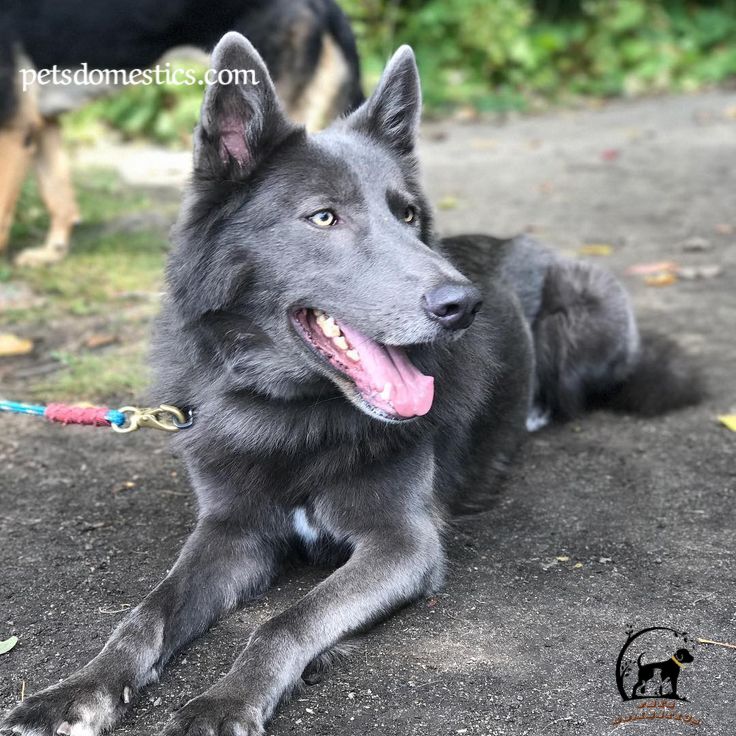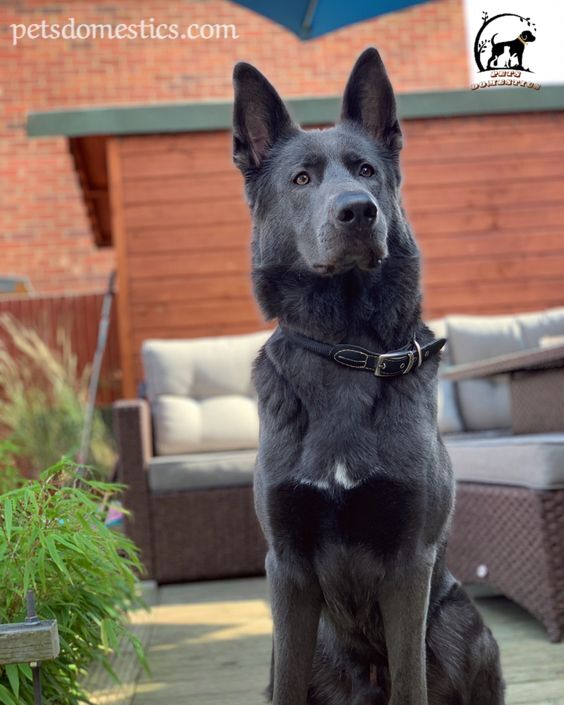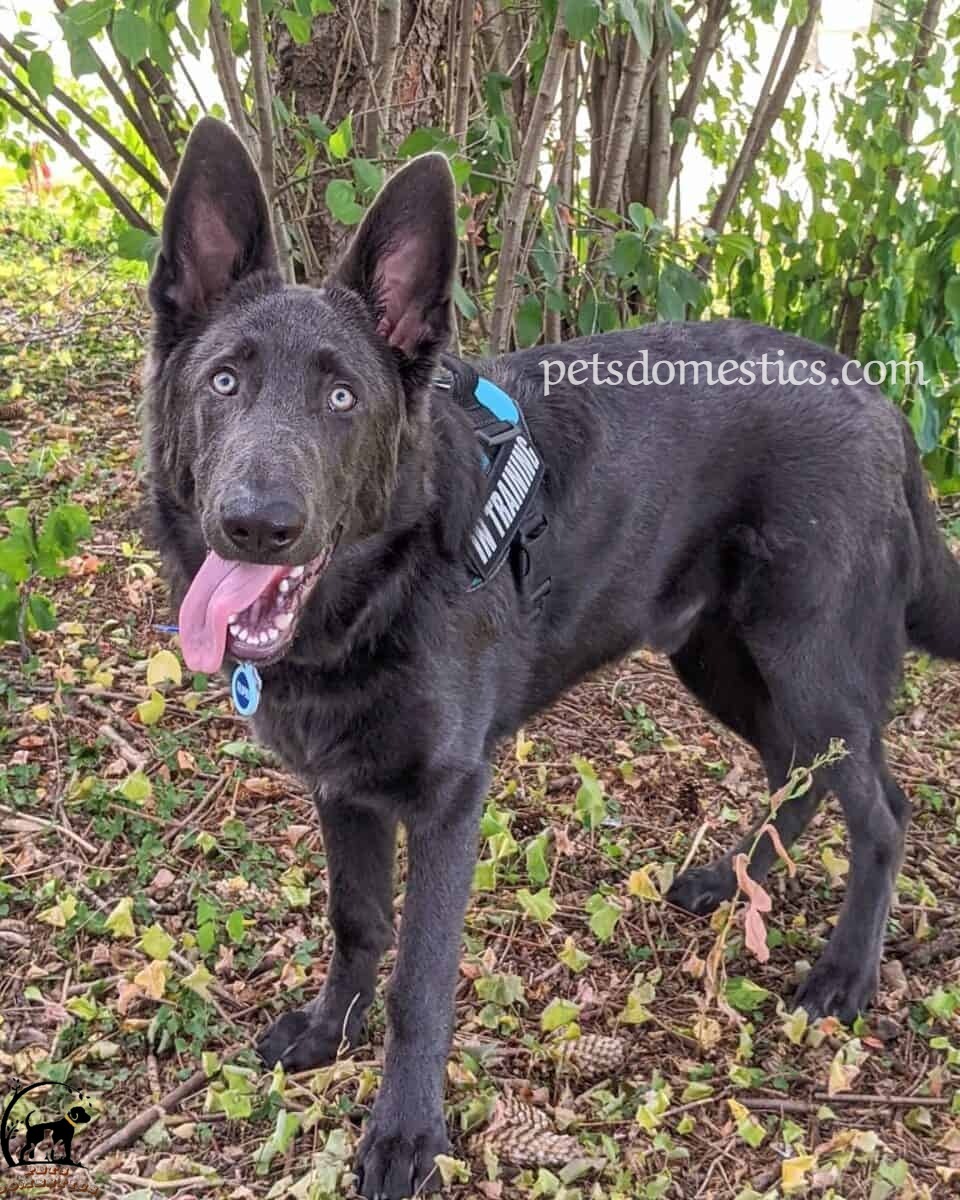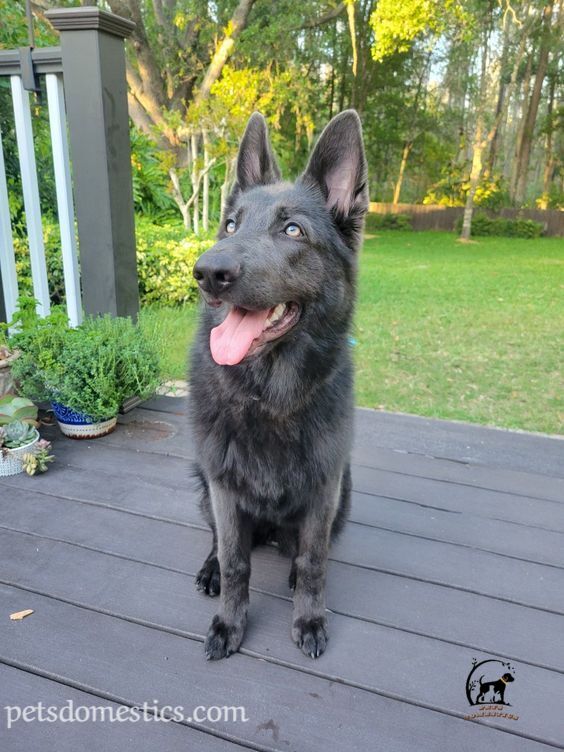Discover essential insights on Blue German Shepherds, covering temperament, size, health, breeders, and common FAQs in this concise guide.
Meet five blue German shepherds

Harbor:
Harbor is a blue German Shepherd who’s like a big, friendly teddy bear. He’s got a beautiful blue coat that makes him stand out. Harbor loves to play and run around outside. He’s happiest when he’s with his family, especially when they take him for walks or play games with him. Harbor is super loyal, which means he’s always there for his family, ready to give them cuddles and make them feel loved.
Jäger:
Jäger is a blue German Shepherd with a lot of energy! He’s like a ball of excitement, always ready for an adventure. Jäger loves going on walks and exploring new places. He’s really smart too, and he enjoys learning new tricks and playing games that challenge his brain. But even though he’s full of energy, Jäger also knows how to chill out and relax with his family. He’s a great cuddle buddy on lazy evenings.
River:
River is a blue German Shepherd who’s as calm as a gentle breeze. She’s got a soothing presence that makes everyone around her feel at ease. River loves spending time with her family, whether it’s going for a leisurely walk or just hanging out at home. She’s really good at understanding how people feel—almost like she can read their minds. River’s gentle nature and warm heart make her a wonderful companion for anyone who needs a friend.
Rogue:
Rogue is a Blue German Shepherd with a wild streak! He’s always up for an adventure and loves trying new things. Rogue excels in sports, relishing running and playing with his family. But he’s not just about fun and games; Rogue is also fiercely protective of his loved ones. He’ll do whatever it takes to keep them safe, whether it’s standing guard or giving them comforting cuddles when they need it most.
Sheiva & Zakara:
Sheiva and Zakara are two blue German shepherds who are inseparable. They’re like two peas in a pod, always together, no matter what. Sheiva is the adventurous one, always leading the way with her bold spirit and fearless attitude. Zakara is more laid-back, providing a steady presence and lots of love. Together, they make an unbeatable team, bringing joy and laughter wherever they go.
Getting to Know Blue German Shepherds
When we talk about blue German Shepherds, we’re talking about a special type of German Shepherd dog with a beautiful blue coat. Now, let’s learn some basic things about them:
Exploring the Temperament of Blue German Shepherds
The temperament of a dog is like its personality—how it acts and behaves. They are known for being really loyal and smart. They’re the kind of dog that will always stick by your side and learn new things quickly. With some training and love, they can be really friendly to everyone they meet.
Understanding the Size of Blue German Shepherds
They are usually about the same size as regular German Shepherds. The males typically stand a bit taller, reaching around 2 feet in height at the shoulder, while the females are slightly smaller. They’re not too heavy either, with boys weighing between 65 and 90 pounds and girls between 50 and 70 pounds.
Learning About the Health of Blue German Shepherds:

Now, onto health. Just like people, dogs can sometimes have health issues. They might have problems with their hips or stomachs sometimes. But if you take good care of them, like giving them healthy food and taking them to the vet for check-ups, you can help them stay healthy and happy.
ALSO CHECK OUT THE: Majestic Struggle Black German Shepherds 2024.
ALSO CHECK OUT THE: Sable German Shepherd Mastery Revealing 2024.
Locating a Blue German Shepherd: Where to Find Your New Companion?
If you’re thinking about getting a Blue German Shepherd, you’ll want to find a good place to get one. You can start by asking around in dog clubs or looking online for breeders. But be careful! Make sure to visit the breeder in person to see how the puppies are treated before you make a decision.
So, there you have it—the basics of Blue German Shepherds! They’re amazing dogs with lots of love to give, so if you’re thinking about getting one, just make sure to do your homework and find the perfect match for you.
Common Questions About Blue German Shepherds
What are blue German shepherds?

Blue German Shepherds are a type of German Shepherd with special blue fur. This color comes from a special gene that makes their fur look blue instead of the usual colors like black and tan. They’re just like regular German Shepherds in most ways, but their blue fur makes them stand out and look really cool!
Why are they called “Blue” German Shepherds?
Blue German Shepherds are called “blue” because of the color of their fur. Their fur looks like a mix of blue and gray. This color comes from a special gene that affects how their fur looks. Even though they’re called “blue,” their fur can have different shades of blue-gray. This makes them look different from regular German Shepherds, who usually have black and tan fur.
Are Blue German Shepherds purebred?
Yes, Blue German Shepherds are purebred dogs. It means they come from the same family as regular German Shepherds, but their fur color is different. They have a special gene that gives them their blue color. Even though they look different, they have the same good qualities as other German Shepherds, like being smart and loyal.
Do blue German shepherds have the same personality as regular ones?
Yes, they’re similar. They’re often loyal, smart, and protective, like regular German Shepherds.
How big are blue German shepherds?
They are usually medium- to big dogs. The males are slightly larger in size compared to the females. They can weigh between 50 and 90 pounds and stand around 22 to 26 inches tall. But remember, every dog is different, so some might be smaller or bigger than this. They’re known for being strong and active, which makes them good at lots of different jobs.

Are blue German shepherds good with kids?
Yes, they can be nice to kids when trained well. They’re often gentle and protective.
Do blue German shepherds shed a lot?
Blue German Shepherds do shed, but it’s not excessive. They have a double coat, which means they have a soft undercoat beneath a thicker outer coat. Shedding is a natural process for them, helping to remove old or damaged hair and regulate body temperature. While they may shed more during seasonal changes, regular grooming, such as brushing, can help minimize shedding and keep their coat in good condition.
What health problems do Blue German Shepherds have?
They can have problems like hip issues and stomach troubles, but if taken care of, they’ll usually be healthy.
How much exercise do blue German shepherds need?
They need regular exercise to stay healthy, like walks, playtime, and running around.
Can Blue German Shepherds live in apartments?
Yes, but they prefer homes with yards. In apartments, they need more walks and playtime.
Do blue German shepherds need special grooming?
They need regular brushing to keep their fur healthy and reduce shedding, but nothing fancy.
Are blue German shepherds good at guarding?
Yes. They are good at guarding. They naturally want to protect their family and home. With the right training and getting used to being around people, they can be really good at keeping an eye out for anything unusual and scaring away strangers. They’re smart, loyal, and brave, which makes them great for guarding.
Do Blue German Shepherds get along with other pets?
Yes, if they are introduced early and trained well, they can live peacefully with other pets.
How much do blue German shepherds cost?
Blue German Shepherds can cost different amounts, usually between $800 and $2000 USD. But some might be more expensive if they come from a good breeder or have special qualities. It’s important to find a breeder who takes good care of the dogs and makes sure they’re healthy.
How long do blue German shepherds live?
They usually live for about 9 to 13 years, but it depends on their health and care.
Do blue German shepherds need a special diet?
No, they don’t need special food. Just give them good-quality dog food that’s right for their age and size. It should have all the stuff they need to stay healthy, like protein and vitamins. You can also give them treats sometimes, but ask your vet if you’re not sure what’s best for them. Giving them good food will help keep them strong and happy.
Do blue German shepherds get anxious when left alone?
Sometimes they can feel anxious if left alone for too long, so it’s important to train them well.
Do blue German shepherds need training classes?
Training classes can be helpful for them to learn good behavior, but regular training at home is also important.
Can Blue German Shepherds be left alone for long periods?
Blue German Shepherds don’t like being alone for a long time because they enjoy being with people. If they’re left alone too much, they might feel sad or bored and do things like bark a lot or chew on things they shouldn’t. It’s okay to leave them alone for short periods, but it’s important to spend time with them and make sure they have things to keep them busy when you’re not around.
What colors are blue German Shepherds when they’re born?
When they are born, their fur is usually dark, like black or gray. But as they get older, their fur starts to change. It gradually becomes lighter and turns into their signature blue color. This change happens over a few weeks or months, and each Blue German Shepherd might have a slightly different shade of blue.
Are Blue German Shepherds recognized by kennel clubs?

They’re not officially recognized as a separate breed, but they can still join events and competitions.
Do Blue German Shepherds need special care in hot weather?
They need shade and plenty of water to stay cool, but their fur helps them handle the heat.
Are they prone to ear infections?
Yes, Blue German Shepherds can get ear infections because their floppy ears can trap moisture and dirt, which leads to bacteria and yeast growing and causing trouble. To prevent infections, it’s important to clean their ears often and keep them dry. If their ears look red, swollen, or have discharge, it’s best to take them to the vet for help.
Are blue German shepherds aggressive?
Not usually, but like any dog, their behavior depends on how they’re raised and trained.
Do Blue German Shepherds need regular vet check-ups?
Yes, Blue German Shepherds should see the vet regularly, just like people go to the doctor. These check-ups help make sure they’re healthy and catch any problems early. The vet will give them shots, check their teeth, and make sure they’re growing well. It’s important to take them to the vet, even if they seem fine, to keep them healthy and happy.
Do they adapt well to new environments?
Yes, Blue German Shepherds can get used to new places if they’re taught and introduced slowly. At first, they might be a bit unsure, but with time and patience, they can feel more comfortable. It helps to show them that new places are safe and fun. Every dog is different, so some might adjust faster than others.
Can Blue German Shepherds be trained for protection work?
Yes, Blue German Shepherds can learn to protect things or people with the right training. They’re smart and loyal, so they can be good at guarding homes or helping in security jobs. But they need to learn from someone who knows what they’re doing and teaches them safely. With patience and practice, they can be great at protection work.

Do they enjoy water activities?
Some Blue German Shepherds might like playing in water, but it varies from dog to dog. Some really enjoy swimming and splashing around, while others might be a bit unsure or cautious. You can help them get used to water by introducing it slowly and giving them treats and praise when they’re brave. Just make sure they’re always safe and supervised around water.
Do they need a lot of attention?
Yes, Blue German Shepherds usually need a lot of attention because they’re friendly and like being with people. They enjoy spending time with their owners and need regular playtime and walks to stay happy. Giving them attention and love helps them feel good and builds a strong bond between them and their owners.
Where can I find reputable breeders?
Reputable breeders can be found through referrals, online directories, and attending dog shows. Always research and visit breeders before buying a puppy.

